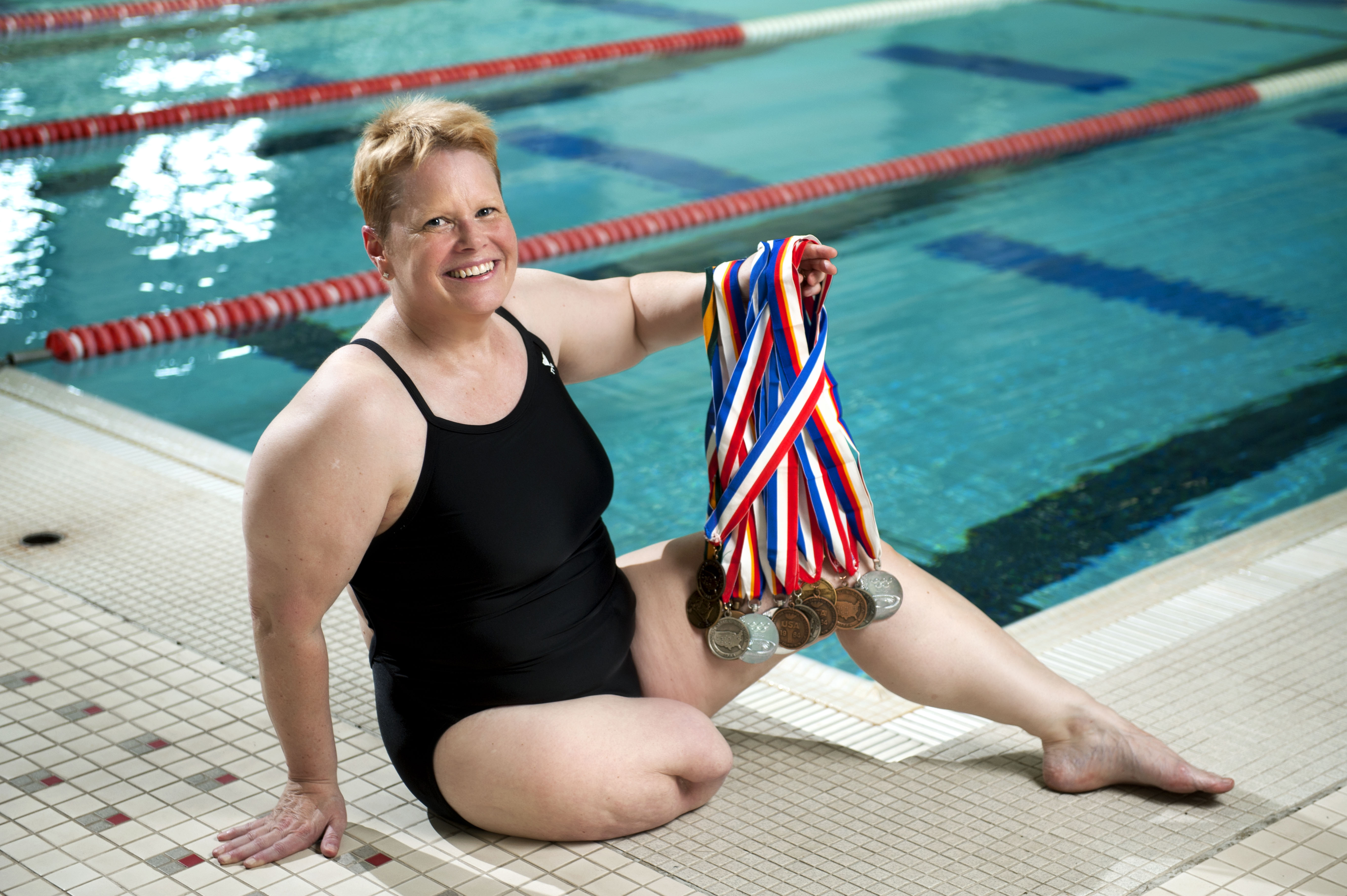Olympic torch shines especially bright for Jan Wilson of College of Architecture and Urban Studies

Like many of us, Jan Wilson of Blacksburg, director of alumni relations and career services for the College of Architecture and Urban Studies, watched some of the world’s most elite athletes compete in the 2012 Olympic Games. But unlike most of us, Wilson’s ties to world-class athletics take on a much more personal meaning.
Later this month, Wilson will be a torch bearer for the Paralympic Games in London. The Paralympics are the world’s second-largest sports event after the Olympic Games, bringing together 4,200 athletes with disabilities from 165 countries to compete in 20 sports. As a lifelong swimmer, Wilson is no stranger to competitive athletics, but nothing was as meaningful as competing in the Paralympic Games in 1980, 1984, and 1988.
Wilson’s Olympic journey began when she was 8 years old. After competing in her first swim meet and winning all five events, Wilson announced she wanted to someday be an Olympian. In 1975, her dream was on track, as she was a member of the women’s swim team at the University of North Carolina at Greensboro.
“I was in heaven,” Wilson said. “I was loving college, enjoying academics, and of course, there was my swimming.”
Not part of Wilson’s plan, though, was a tumor growing on the femur of her right leg.
Wilson endured several months of debilitating pain, although she continued to swim until her knee completely buckled one day as she was climbing stairs. Doctors eventually diagnosed the pain as a malignant osteoblastoma, a rare form of bone tumor. Her options, as put forth by her surgeon, were less than pleasant: either remove the tumor and fuse her leg bones together leaving her with no knee, or amputate most of her leg.
Wilson remembers thinking to herself, “I wish he would just take my leg so that I can be free of this pain.”
When she awoke from surgery, her doctor was standing over her and cried when he gave her the news that he had amputated her leg.
But Wilson consoled him saying, “It’s OK. It’s not the end of the world. Besides, I have another one!”
Reflecting back on it, Wilson believes that same can-do spirit has played out in most everything she does in life.
“I try to make the most out of what I’ve got,” she said. When she returned to college the following semester, her teammates encouraged her to come back and swim with them even though she wasn’t able to compete.
“I wanted people to know I was normal; I was not a freak,” she said.
Wilson’s training focused almost entirely on developing upper body strength, and not surprisingly, she did it with gusto. Eventually, she was introduced to the Paralympics. After placing first in all five of her events at regional and national competitions for disabled athletes, Wilson made the U.S. women’s swim team for the 1980 games held in Arnhem, Holland.
At the Paralympics, Wilson won a bronze medal in the 100-meter breaststroke and was a finalist in the other four events she entered.
“There was an amazing level of athletes from all over the world,” Wilson said. “It really made me hungry for the next four years.”
Those years were spent in intense training, which paid off. In the 1984 Paralympics, Wilson entered seven swimming events and won seven medals, one of them gold. She walked away with more medals than anyone on the U.S. team that year. Those games were especially notable because Wilson was selected to be one of the torchbearers who lit the Olympic flame during the opening ceremony.
In 1988, at the age of 33, Wilson entered her third, and final, Paralympic Games. She competed in six events, and won four medals. After the games, she decided to remain active in the worldwide movement to promote and support disabled athletes. She served as executive director of the U.S. Amputee Athletic Association and later as a liaison to the U.S. Olympic Committee. As fate would have it, it was in the latter role that she met Karen DePauw, the university’s vice president and dean for graduate education. DePauw is considered a pioneer in the grassroots effort to obtain sponsorship and funding for training, coaches, and even uniforms for athletes with disabilities.
“It’s a challenging and frustrating effort at times,” Wilson said. “I don’t expect to see these changes in my lifetime, although it was inspiring to have some progress occur while I was involved.” She said one positive that came out of the movement was an agreement between the top governing bodies of both Olympics to hold the Paralympic Games in the same city as the Olympic Games. In the past, the two events were held in separate locations. Recently, that cooperative agreement was extended until the year 2020.
Having already met DePauw, Wilson became part of the Virginia Tech community in 2006. It’s safe to say some of her biggest fans are students who flock to her for support and encouragement in finding a future career.
“I tell them not to limit themselves because anything is possible,” she said. “It’s not what you can’t have; it’s what you can have.”
Wilson uses herself as an example.
“Every opportunity I have is built on something from my past. I can try anything, and I can do most anything I try,” she said. “And the students can too.”
The comforting words she offered her distraught surgeon years ago, have become her life’s mantra: “Don’t worry. I have another one!”
On Aug. 29, Wilson will be one of five past Paralympians selected to carry the torch into the Olympic stadium. Just like the Olympic rings, her life has once again come full circle.




